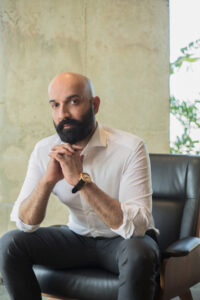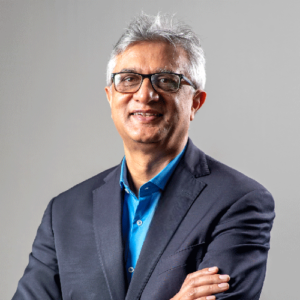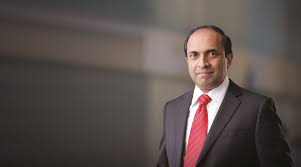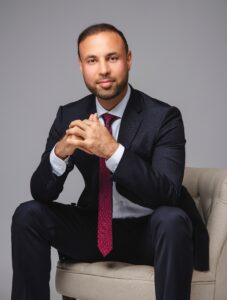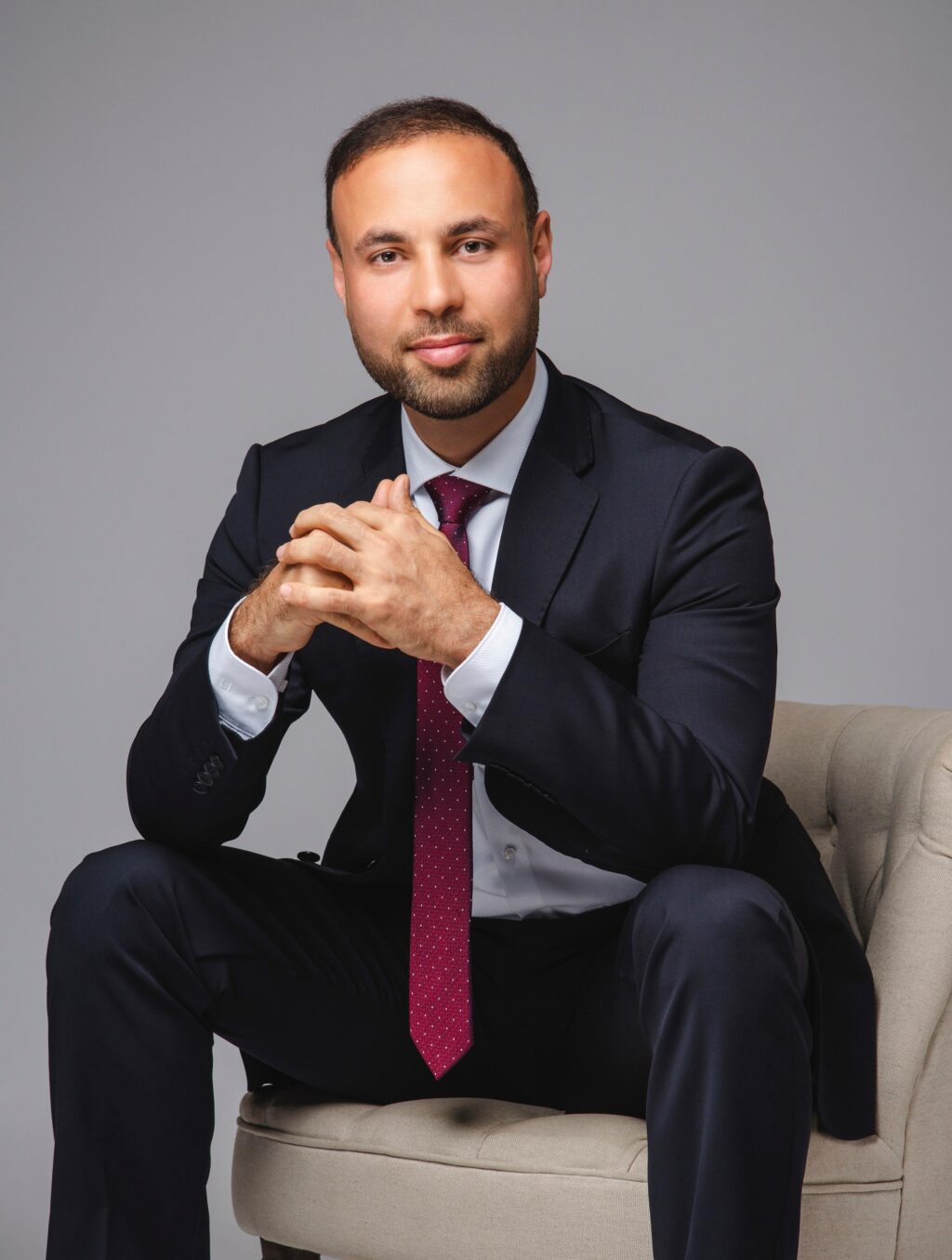
Longtrepreneur continues to bring the best-in-class tech and business leaders to get their take on long-term thinking in the world of Commerce, Corporate Communications, Technology, Real Estate and Entrepreneurship.
This week’s “Take the L” series guest is a personality who needs no introduction: Farhad Azizi (Group Chief Executive Officer).
Here is the conversation in an interview format between Yawar Abbas (Longtrepreneur) and Farhad Azizi (Group Chief Executive Officer – Azizi).
Yawar Abbas: What’s the one thing about your employees working at Azizi Developments that frustrates you?
Farhad Azizi: We now have approximately 36,000 diligent men and women employed with us here in Dubai, and they are truly the cornerstone of our business. I’ve always believed in being a people-first organization. When your employees are happy, your customers will be too.
That said, this is a tough question—but I’ll answer it honestly. What frustrates me most is when employees become overly subservient—waiting to be told what to do, lacking initiative, and requiring constant micromanagement. It creates a lose-lose situation. When someone can’t operate independently, it not only drains their manager’s time and slows down the team, but it also stunts their own growth. I prefer to work with people who take ownership and make sound decisions without needing constant direction. We hire based on merit and potential—so I expect to see that translated into proactive, independent action.
Yawar Abbas: What’s the one quality your father has which you see within you?
Farhad Azizi: Growing up, I saw my father build our company from the ground up. His determination and resilience inspired me to embrace his legacy and encouraged me to find my own path in real estate. Watching him deal with challenging situations taught me not to fear setbacks: failure is simply a stepping stone to success. As the eldest among my siblings, I value the wisdom he’s passed down—especially his unwavering belief in perseverance. I continue to learn from his example, seeing how he handled challenges with grace and inner strength, which motivates me every day.
But what I admire most about him—and what I try to carry forward—is his humility. There’s no bling, no facade. He’s direct, transparent, and consistent—his mind and heart are always aligned. He doesn’t say one thing and does another. He doesn’t play politics, and while that blunt honesty can turn some people off, I find it beautiful. That kind of clarity and authenticity is rare, and it’s one of the key reasons behind his success.
His values guide me even now. He remains a role model not just because of what he’s achieved, but because of how he’s done it—with honesty, humility, and heart. I now focus not just on preserving or emulating what he built, but on pushing it further. It’s about evolution—taking the foundation he laid and advancing it with a new generation’s perspective. The world moves fast— what worked yesterday might fail tomorrow. That’s why the next generation must step in, not to replace, but to evolve. Without that shift, growth stalls and stagnation sets in.
Yawar Abbas: In one word, who is Farhad Azizi?
Farhad Azizi: I’m a doer. I don’t wait around—I act. “Good things come to those who wait” is overrated. I don’t see patience as much of a virtue, in most contexts at least. You want change? Change it. You want results? Make them happen. Patience has its place, but progress doesn’t come from sitting still. I have an innate disdain for dormancy and laziness.
There is a beautiful parable I was once told. A man prays for God to save him from a flood. He refuses help from a boat and a helicopter, saying “God will save me,” then dies—and in heaven, God says, “I sent the boat and helicopter.” I believe in faith, but even if your path is already written, you must still act to move forward on it.
Yawar Abbas: What is the one development project of which you are most proud?
Farhad Azizi: I take pride in all our projects; each one is very carefully planned to reflect the different needs and wants of the market. I am especially confident that Burj Azizi, set to be the world’s second tallest tower at 725m, with its many world record-breaking features, will become an iconic landmark with lasting significance. It is the only project built as fully freehold on Dubai’s Sheikh Zayed Road, opposite to the Dubai World Trade Center. There are a total of 1,038 homes, of which 128 are truly awe-inspiring ultra-luxury penthouses, as well as an all-suite seven-star hotel inspired by seven cultural themes, and a vertical retail center with high-end brands spread over seven floors. Burj Azizi will feature the highest hotel lobby in the world on level 11, the highest nightclub on level 126, the highest observation deck on level 130, the highest restaurant in Dubai on Level 122, and the highest hotel room in Dubai on level 118. This is our pride and joy, our legacy.
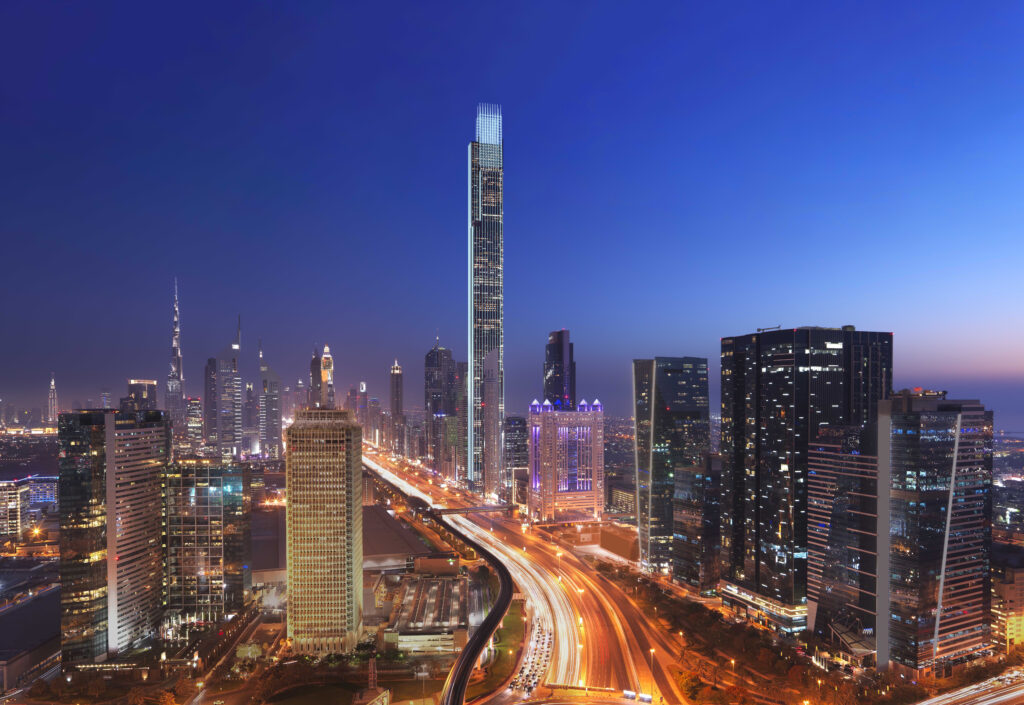
Azizi Venice, our venetian-inspired luxury waterfront lifestyle community set entirely within a swimmable crystal-blue water lagoon in the rapidly growing Dubai South, excites me as well. With over 36,000 apartments and 109 ultra-luxury Monaco Mansions that comprise 6-8 bedrooms, their own private beach accesss, multiple pools, a cinema, a spa and much more, and an AED 2.5 billion Cultural District featuring a stunning opera, reviewed by His Highness Sheikh Mohammed bin Rashid Al Maktoum, Vice President and Prime Minister of the UAE and Ruler of Dubai, this is truly a master planned community project to behold.
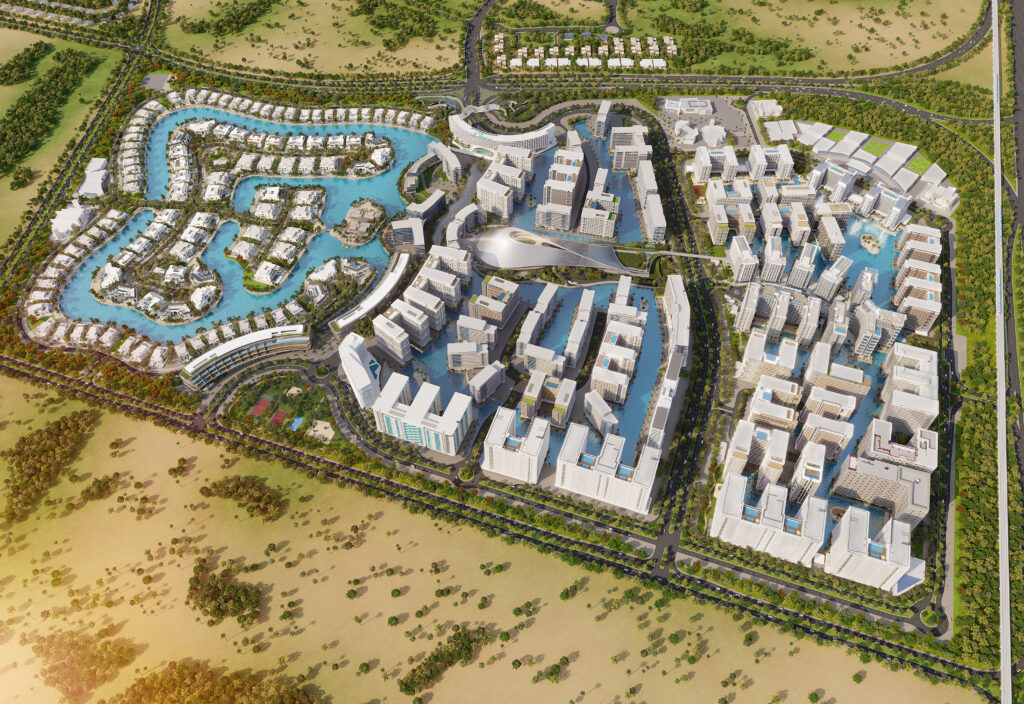
And then we have our most recent launch, Azizi Milan. Guided by the principles of sustainability, nature, and the cultured refinement of Italian fashion, this 81,200-home community is set to bring the timeless Milanese charm to Dubai. At a total value exceeding AED 75 billion, it is slated to cover 40,000,000 sq. ft. in GFA making it one of the largest mixed-use communities in the entire UAE. The master plan will be home to a population of 144,000, with 800 hotel keys to be created. The first building that was released for sales had sold within just an hour of it being launched!
I am passionate about each and every single one of our projects – they all have their individual merits. We currently have around 150,000 units under construction and have already delivered more than 40,000 homes!
Yawar Abbas: What is your message to consumers in Canada that are looking to buy property in Dubai?
Farhad Azizi: Dubai’s property sector will continue to thrive. This is driven primarily by the city’s many merits, with it being the best place to visit, live and work in. Its world-renowned safety, its outstanding legal and regulatory framework, its welcoming, tax-free, opportunity-rich and highly business-and investment-conducive environment, and its status as the world’s most popular tourist destination, all contribute to the surging population (expected to hit 5.8 million by 2040) and visitors, and as such, to the exponentially growing popularity of real estate here.
With all this in mind, the ‘product’ that Dubai is, is far superior in its offerings than other major metropolitan cities across the globe – cities that have far fewer advantages, yet where square foot prices far surpass those here. As such, properties in Dubai are truthfully worth significantly more than what are currently being sold for, especially when compared to the price points of other major mature markets, and that will have to balance itself out over the coming years.
As a result, prices must continue to increase. For a comparison, In Dubai’s primary market, the average purchase price ofresidential properties reached AED 1,558 per square foot in Q3 2024, less than half of the prices in any Germany city, London, and various other cities across the globe that have much less to offer. As is expected in any healthy market, minor price corrections are likely to occur here and there, perhaps even in 2025, but most likely at a later stage, and will be overshadowed massively by the mid- to long-term surge in prices. As such, my outlook remains decidedly positive.
Yawar Abbas: What’s the one quality which differentiates Azizi Developments from Emaar and Damac?
Farhad Azizi: Much like the visionary, forward-thinking leadership of Dubai, we strive to plan ahead for future generations. While projecting 50 years into the future has its limitations—we don’t claim to have a crystal ball—we do have an ambitious, yet carefully structured vision. We take inspiration from Japanese companies renowned for long-term strategic thinking, such as Panasonic, which has developed a 100-year management plan, and SoftBank, which has articulated a 300-year vision focused on AI and global investment. We aim to adopt a similar approach—ambitious in scope, yet flexible enough to adapt to the fast-evolving global landscape. It’s not survival of the fittest— it’s survival of the most adaptable. We must continuously expand our knowledge and stay attuned to the shifting needs of Dubai’s growing population and beyond. Only by understanding what people desire today and anticipating what they will need tomorrow can we remain relevant and impactful.
Our mission remains steadfast: to enrich lives for generations to come. We will continue to fulfill this mission not only through the development of sustainable, lifestyle-enhancing communities in Dubai but also internationally. We are currently establishing our footprint in high-growth markets
including Europe, the United States, and Australia. While Dubai will always be home and the heart of our operations, we are taking proactive steps to introduce Azizi as a global, Dubai-born brand— with many exciting international projects to be announced in due course.
Beyond real estate, we are making major investments in other sectors. In hospitality, we’re investing AED 60 billion over the next five years to develop and operate 50 high-end hotels under our newly launched hospitality brand. We are also advancing initiatives in banking, energy, and several other strategic industries to diversify and strengthen our portfolio.
Our philanthropic efforts will always be a cornerstone of our identity. Our CSR activities span both the UAE and global communities, with a strong focus on sustainability, equality, healthcare, education, and sports. This year, we’ve donated AED 3 billion—the largest private contribution in UAE history—to the Fathers’ Endowment campaign by the Mohammed bin Rashid Al Maktoum Global Initiatives. We also contributed AED 600 million to the Mother’s Endowment campaign and AED 100 million to the 1 Billion Meals initiative, helping to combat global hunger and malnutrition.
Our commitment also extends to supporting inclusion and care for people of determination. We’ve partnered with the Rashid Centre for the Determined Ones for seven consecutive years and supported institutions such as the Dubai Autism Center and the Special Needs Future Development Center. Our sizable contributions to AWQAF initiatives also support sustainable causes across healthcare, education, and support for orphans and underserved communities. We’re proud to be the pillar partner of the Dubai World Cup, a position we’ve held for eight years and counting.
As we look to the next 50 years, our path is clear: we will continue to build world-class developments, expand into new markets, lead across industries, and give back to communities— anchored by our enduring mission and values.
Yawar Abbas: What’s your one piece of advice for aspiring real estate developers?
Farhad Azizi: If you’re looking to succeed in real estate development, start by genuinely understanding your customers. This industry isn’t just about buildings—it’s about creating spaces where people feel at home, secure, and fulfilled.
Always put the client first and stay adaptable as market conditions evolve. That flexibility, paired with a commitment to quality and trust, will set you apart. Choose top-tier materials and reliable partners—cutting corners might save money in the short term, but it will cost you long-term in reputation and durability. Pay close attention to your procurement process, and above all, stay transparent. Transparency earns trust, and trust builds lasting relationships. In a competitive market, the difference between a good developer and a great one lies in how well you listen, how much you care, and how consistently you deliver quality.
But before all of that, I always remind people: real estate is the biggest industry on the planet. Roughly 80% of all debt globally is collateralized against real estate. It’s not just about physical assets—homes, offices, malls, infrastructure—it’s about what powers the broader economy. Real estate is the backbone that supports nearly every other industry, from manufacturing and logistics to technology and finance. Being part of this mother of all industries is something to take pride in. Aspiring developers need to appreciate its scale and influence, and just as importantly, identify where they can truly excel within it. Don’t try to do everything. Be a designer of outcomes.
Yawar Abbas: How do you define good design?
Farhad Azizi: Good design is multi-dimensional, but at its core, it starts with functionality. In all our developments—particularly in our latest master-planned communities like Azizi Venice and Azizi Milan—functionality is paramount. We focus on intelligent space utilization, logical layout and flow, accessibility, flexibility, ample storage, natural lighting and ventilation, ergonomic comfort, privacy, technological integration, and strict adherence to safety and compliance standards. But functionality alone is not enough. Good design must also be emotionally engaging. A home should resonate in its aesthetics, on a sensory and psychological level. Visual appeal, tactile surfaces, acoustics, and even olfactory senses contribute to how a space feels. Emotional impact is deeply personal, influenced by an individual’s experiences and preferences—what feels like home to one person might not to another.
Our mission is to enrich lives. That means treating every design element with intention. Each decision is backed by extensive market research, expert input, internal committee reviews, and thorough approval processes. We create spaces that are both practical and beautiful—designed to enhance daily life in real, tangible ways.
Today, luxury is no longer about excess—it’s about purpose. Buyers are increasingly drawn to design that offers advanced functionality rather than ornamental excess. Where emotion and logic once conflicted—decorative features pleasing the eye but offering little utility—that gap has now closed. Functionality itself has become emotionally satisfying. Minimalism and purposeful design have accelerated this shift, and we are proud to be at the forefront of that evolution.
Yawar Abbas: What is the psychology of design according to you?
Farhad Azizi: The psychology of design is fundamentally about understanding how design influences human perception, behavior, and emotion. It’s not just about aesthetics—it’s about creating spaces that feel intuitive, comfortable, and emotionally engaging. Good design anticipates how people think, feel, and act. It aligns with the way our minds process information and respond to our surroundings, shaping environments that support well-being, clarity, and ease of use.
One core principle, for example, is cognitive load. When spaces are simple and logically structured, they reduce mental effort and make navigation and decision-making easier. Visual hierarchy also plays a critical role—by using size, contrast, color, and positioning effectively, we can guide attention to what matters most. Gestalt principles help shape perception by leveraging the human tendency to recognize patterns; concepts like proximity, similarity, continuity, and closure influence how people interpret forms and group elements within a space.
Color psychology is another powerful tool. Colors evoke emotional responses—blue can instill a sense of calm and trust, while red may create a feeling of urgency or excitement. Emotional design goes beyond function, aiming to create a deep, positive emotional connection between the space and its user. Affordances and signifiers—visual cues that suggest how something is used—are essential for intuitive interaction; for instance, a door handle should clearly indicate whether to push or pull.
Familiarity and consistency across design elements reduce confusion, helping users feel at ease. Additionally, offering feedback and a sense of control within the environment— whether through smart home technology or responsive layouts—empowers residents and builds trust in the space.
Moreover, our design philosophy is centered on building a sense of home and belonging. We want our residents to feel that the space understands and supports them. Our spaces are crafted to promote social interaction and active lifestyles, while spacious interiors and natural lighting create a warm, uplifting atmosphere.
Every element—from the layout to the material choices—is designed to make residents feel at ease and in harmony with their surroundings. Ultimately, thoughtful design is about making life better in meaningful, often subtle ways. By deeply understanding the psychology behind how people experience and interact with space, we’re able to design homes that don’t just look beautiful—they feel right.
Yawar Abbas: What’s your favourite dish to eat in Iranian cuisine?
Farhad Azizi: Even though I’ve grown up in Dubai, my entire extended family resides here, and I’m raising my kids here, my roots are originally in Laghman, Afghanistan. Many dishes are shared between Iranian and Afghan cuisines due to geographic, cultural, and historical overlap. I don’t know where to start with the countless flavorful, nutrient-dense dishes originating from that part of the world.
That said, Kabuli Palao stands out above all. It’s the national dish of Afghanistan but one that’s deeply appreciated across the region, including in Iran. Fragrant basmati rice, tender slow-cooked lamb, sweet carrots, and raisins—all layered together with subtle spices—make it incredibly rich and balanced. It’s a dish that represents hospitality, celebration, and heritage. The complexity in flavor and texture is unmatched, and it’s something I always look forward to eating with family.
Of course, Iranian cuisine also has its gems—Zereshk Polo with its tart barberries and saffron rice, or Kashk-e Bademjan, the creamy eggplant dip with garlic and mint—but for me, Kabuli Palao captures the heart of where I come from.
Yawar Abbas: How can people contact you?
Farhad Azizi: Maintaining an open-door policy is key to sustained growth. I used to share my personal mobile number publicly, but that led to a flood of irrelevant sales pitches. Now, I provide my email— Farhad@azizidevelopments.com. My team filters messages, and anything that requires my attention and action will reach me.

